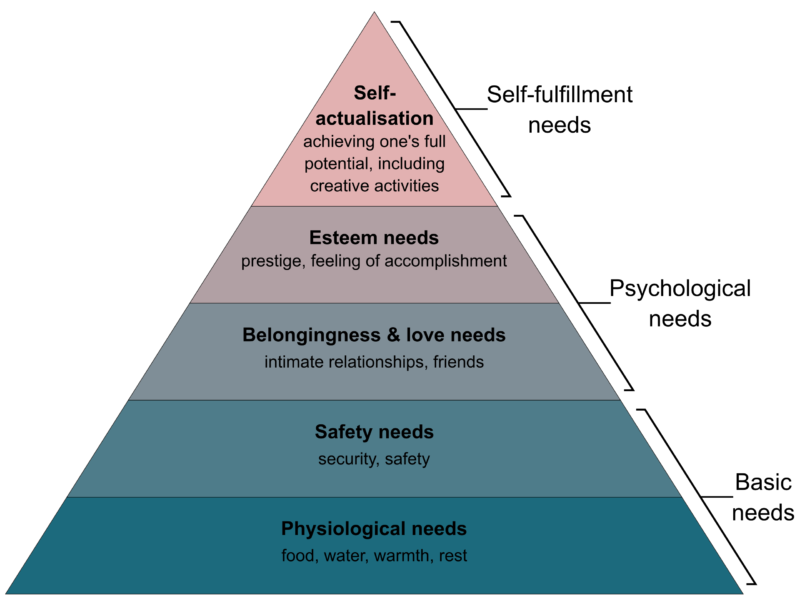Have you tried and failed to get more organized? Interestingly enough, psychology sheds some light on a deeper reason for disorganization!

What if I told you there just might be a deeper reason why you haven’t been able to organize your home, your schedule, and your life?
That it might be more than simply a lack of time or energy or self-motivation.
Even more than the fact that your family doesn’t help, or that you struggle to say “no”, or that you really really enjoy shopping!
That all factors in, of course…
BUT, what if you dug a little deeper and found that the root of your disorganization actually stems from an unmet need you didn’t even realize you had?

Back in college, I became fascinated with Maslow’s Hierarchy of Needs and how clearly and accurately it explains human behavioral motivation.
I eventually minored in Psychology, almost by accident, because I was so interested in the subject and continually signed up for more phycology classes.
A Brief Overview of Maslow’s Hierarchy of Needs

Abraham Maslow (a psychologist in the 1940’s) stated that humans are motivated to achieve certain needs… and that when one need is fulfilled we naturally seek to fulfill the next need.
These needs are usually depicted as a 5-tiered pyramid — with the most basic and essential needs at the bottom.
I’m far from an expert, but I understand enough to give you a quick overview of each different level of needs.
1. Physiological Needs
The very basic essentials necessary for human existence are found in the bottom tier — things like oxygen, water, food, sleep, warmth, and shelter.
If we don’t meet these biological (physiological) needs, we will die.
Period.
2. Safety Needs
Although life can exist when only our very basic biological needs are met, the reality of a life void of safety is harsh.
Safety needs include security, order, law, and stability — things we often take for granted in our day-to-day lives here in Western culture.
Our own homes, families, and societies are also deeply affected by a lack of security, order, law, and stability.
Your children would constantly wonder if you’d be there when they woke up in the morning. You’d worry that someone might break into your home because law enforcement wouldn’t prevent this type of behavior. And driving would be a nightmare without some sense of order and law!
3. Love and Belonging Needs
From the moment we’re born, we crave love and belonging — this is why it’s so important to have “skin to skin” contact with new babies, and why children in orphanages often struggle to thrive, even when their basic physical and safety needs are met.
We all have an innate desire to belong and to be loved. Even extreme introverts need a sense of connection and relationships with others.
Of course, we don’t all need the same level of affirmation when it comes to love and belonging (this often correlates to our different love languages) but science, Scripture, and real-life experiences all prove that life without love and a sense of belonging is very dull.
From an early age, humans (and animals) know when we do or don’t “belong”. Bullying, suicide, addiction, anxiety, and depression are often negative ramifications of unmet needs for love and belonging.
4. Esteem Needs
The desires to achieve greatness, master specific skills, better ourselves, improve, and become more independent are present in all humans. HOWEVER, we will rarely act on these desires unless our more basic needs are met.
**THIS is where things get interesting — and this is the “need level” I will focus on later in the post! **
5. Self-Actualization Needs
At the top of the pyramid, we find our own personal “highest potential” as we meet self-fulfillment needs like personal growth, peak experiences, and creative activities.
Meeting these high-level needs is not a requirement for a life of joy and service (those are daily choices we can make, no matter how rough our circumstances), BUT when we are able to live into our full potential, it is much easier to then pour into the lives of others.
Interestingly enough, Maslow estimated that only 1% of humans ever reach this top level!
I’m not sure if this percentage has changed over the years or not — I honestly wouldn’t be surprised if the number is lower these days. Either way, it’s safe to assume that we won’t all experience the fulfillment of our self-actualization needs, but yet we can still live a very fulfilling life.

What I find SO fascinating about this hierarchy of needs is that we must continually satisfy the lower-level needs before meeting the higher-level needs.
Once lower-level needs have been reasonably satisfied, we almost instinctively begin to work towards reaching higher-level needs. However, if something disrupts any of our lower-level needs, we often instantly revert back to a lower level on the pyramid again.
Let me give you a few examples:
1. A Plane Crash:
If your plane crashed in the middle of the ocean, your very first instinct would be to get above water so you could breathe (physiological). Once you were above water, you would then most likely look for something to float on (safety) while you tried to get to a rescue boat.
I doubt you’d worry about developing a relationship with any fellow passengers (belonging). And you certainly wouldn’t even think about the promotion you’re up for at work (esteem).
2. School Breakfast Programs
Studies show that children who eat breakfast do better in school. This makes sense because if their basic physiological need for food is not met, they won’t be able to meet higher needs (belonging and esteem) as they’ll be preoccupied with how hungry they are.
Many organizations in our area provide free breakfasts for low-income families and I’m so thankful for the work these volunteers do!
3. Living in “Survival Mode”:
We talk about being in “survival mode” when we are extremely tired, overly busy, recovering from an illness, or after bringing a new baby home — this is often because we only have the ability to meet our basic biological and safety needs, but we rarely have the time or energy to devote towards personal growth or mastering a new skill.
Yes, I could relate to this during my periods of post-partum depression — I was “stuck” searching for love and belonging (not because I wasn’t getting it, but because I couldn’t see it) and that made it nearly impossible for me to focus on any of my higher-level needs.

OK, so what does this have to do with decluttering & organizing?
Actually… a lot!
Activities like cleaning, organization, time management, productivity, and efficiency fall under “Esteem Needs”. They are tied to our innate desire to improve ourselves and our environment.
This means that if our more basic psychological, safety, and belonging needs aren’t met, there’s a decent chance we won’t be able to meet our esteem needs either.

Of course, this is not a black and white issue — there will always be exceptions to the rule.
My intention for sharing this is not to give you an easy excuse to be disorganized or to continually justify your late arrivals.
Rather, I hope to shed light on how human motivation functions (according to science), and offer an opportunity for reflection on our own lives.
What about you?
Do you struggle with disorganization and time management despite a strong desire to change? Could it be that one or more of your lower-level needs are not being adequately met?
Ask yourself: “Am I currently experiencing any life changes or trauma that has left other, lower-level needs unmet?“
- Maybe you just had a baby or are recovering from an illness.
- Maybe you are the caregiver for a high-needs child or an elderly parent and simply don’t have the time or energy to pursue your own passions right now.
- Maybe you’re suffering from an undiagnosed condition (like Crohn’s, ADHD, or a Thyroid problem) that has huge effects on your energy levels.
- Maybe you’re struggling to pay off debt or you recently lost a job and are concerned about your financial safety.
- Maybe you’re involved in an unhealthy relationship (physical, mental, emotional) and live in fear or with lots of anxiety and depression.
All of these situations (and countless more) could easily “sabotage” your ability to meet the higher-level needs required for personal growth activities like organization, time management, and simple living.
The unfortunate consequence, however, is that living a disorganized, unstructured, chaotic state further inhibits our ability to surpass our lower-level needs — which, then makes it even less likely that we will have the time, energy, or resources to create order in our homes and lives.
It’s a vicious cycle.
Bottom line: If our lower-level needs are NOT met, we will be left constantly fighting an uphill battle in our quest for simplicity, organization, productivity, time management, and other esteem or self-fulfillment needs.
This is not to say it’s impossible to bypass a lower-level need to achieve a higher-level need (we all love a good “underdog” victory) but it’s far less likely than the movies depict.

I realize this is a fairly long and “meaty” post… but information like this needs to be more accessible to those of us who might not naturally think to do the research.
Instead of beating yourself up over the fact that you aren’t as organized as you’d like to be, or that you can’t seem to make time for activities you really want to do, I encourage you to dig deeper and consider what lower-level needs might remain unmet — thus preventing you from pursuing higher-level needs. Then focus on meeting THOSE lower-level needs first (journaling, therapy, and professional counseling may be helpful resources).
You might just be surprised what you find!



Candis says
I feel like I have read so many of your posts over the years and I don’t think I have read this one before. This article definitely hits home for me in a lot of ways. Thank you for sharing Andrea.
Andrea says
Well I’m certainly glad you “found” this post again all these years later!
Kristina says
Thank you for this post – it helps me put things into perspective. I have been struggling with health issues for the past two years and have such a hard time finding energy to clean my home. And then I go and beat myself up about not cleaning. Thinking about your words will at the very least help me stop a vicious cycle of self-criticism. Thank you!
Andrea says
you’re welcome, Kristina! Self-criticism won’t get you anywhere, so I’m thrilled if anything I wrote might help you stop that cycle!
it’s tough when you can’t physically do what you mentally want to do, and maybe even what you COULD do in years past. I’m sorry you’re dealing with this right now.
Lynn says
Thank you! This really resonated with me. I appreciate you taking the time to explain all of this. I also had forgotten about the psychological part.
Debbie says
I actually never thought about this correlation at all. I also loved Psychology when I was younger and thought I should have minored in it. It is just so interesting and actually very helpful in knowing oneself as well as others. Thanks Andrea.
Andrea says
Well, I’m happy to give you something new to think about 🙂
Meg says
Holy moly, this couldn’t have come at a better time for me! I am constantly beating myself up for not getting organized – I’m also dealing with Thyroid issues and ADHD! My daughter and husband have Crohn’s and my daughter is really struggling right now. While she’s a young adult, she still lives at home & I am somewhat her care giver. Thanks to you, I now understand WHY I struggle so much. I was a Psychology major in college and totally forgot about this heirarchy. How were you able to keep up with your blog during your PPD days? I remember when Nora was barely sleeping – you still seemed to be on top of everything… am I remembering correctly? I’m curious how you managed. I’m always looking for suggestions how to manage life and still get things done.
Thank you so much for this post!
Andrea says
Hi Meg,
Yeah, you have a lot going on in your house!
As for me, I think it’s slightly different because I already had a really great system in place with routines, schedules, goals, etc. before Nora was born — so while her lack of sleep was definitely life-altering, I knew that if I just kept plugging along with my current routines, I would be fine. I never could have done it if I were starting from scratch trying to dig myself out of clutter and create a brand new routine.
I also quit almost everything else I was doing pre-children — all outside activities, groups, committees, etc. So I just took care of Nora, kept our house fairly clean, made lots of semi-homemade foods, and did the blog.
And honestly, I think a huge factor is that blogging was a much different world back then. It only took me an hour to get a blog post up — now it takes several hours for one post + email with all the extra hoopla we are “forced” to do in order to stay in the game.
Meg says
Aha! That’s great you already had a good system in place. I’m so tired of struggling – we are getting new carpet on our upstairs floor soon and I’m going to take the opportunity to do a massive purge. I’ve tried to purge many times but I feel like a dog chasing it’s tail – all I do is shift piles!
We have lived in our home for 21 years and have a lot of stuff – most of which we do not need.
I envy your ability to focus and persevere! I continue plugging along without much to show for it. Thank you for your response
KLC says
Hammer hits nail, directly on the head.
A letter of reference from a former boss emphasized my “superior organizational skills”. Years later, I was wondering what had happened to them, as I surveyed the stacks of unfinished paperwork, mending, unused cleaning supplies, and scattered toys surrounding me.
Ten months ago, I finally walked out of a 35 year, highly abusive marriage and all the inherent safety and security issues. Lo and behold, I am starting to see clean surfaces again. I still have setbacks, days I just can’t deal with much of anything, but overall, things ARE improving.
This was not an inconsequential post. Thank you.
Andrea says
I’m sorry to hear about all your pain — and for 35 years!
I imagine you’ll have “setbacks” for a while, but it definitely sounds like you are making forward progress! Good for you!
Sonja says
Thanks for good insight, as always.
Aura Whittaker says
I knew there was a reason your blog is the ONLY one I still follow. You are truly an intelligent individual that really knows people inside and out. You’re a kindred spirit and I’m so thankful you are in my life!
Andrea says
aw — thanks Aura 🙂
DENISE E RAMBO says
My house is, and has been a DISASTER, for the past 20 years. I’ve always been a pack rat – and the fact that I enjoy shopping and getting a good deal like most people enjoy a sport or other hobby, doesn’t help. BUT … I lost my partner 26 years ago and a few years later got involved with a man I had been friends with for about 25 years. Ultimately, he did not turn out to be the kind of man I had always thought he was, and he broke up with me in a very cruel way – and it broke me. I am fully aware that the condition of my home is a defense mechanism. I wouldn’t DREAM of letting anyone in my house the way it is. (Don’t get me wrong … I’m not a hoarder and my house isn’t full of garbage or unusable items. There’s just a lot of STUFF. Which also explains my debt load.) I recently decided to sell my house and it was a BIG STEP for me to even let the realtor in the house. There’s an investor coming to see the place tonight and I’m really glad I’m not supposed to be here when people come to see it. In the past few of weeks, I’ve taken a couple of truckloads of stuff to charity and sold quite a few things. We have an “exit date” of August 1st. Wish me luck.
Andrea says
oh wow — what a story!
I think it’s very brave of you to put your home on the market — it’s a great step towards a “new beginning” for you!
Sarah Popovczak says
You’re so right about that vicious cycle aspect! My children are 6,4,3,18 months, and 4 months, and I have to keep reminding myself that it’s not my season for the whole house overhaul I long to do. It’ll be easier when they’re older, but it would make my current situation so much easier to have it done already! This was a good reminder to be patient as well as faithful today.
Andrea says
oh wow — you have a full house of very little kiddos who demand a lot from you!
give it a few years — you’ll be amazed at how much more mental and physical energy you have!
Meg says
I love how you phrased that – it’s “not your season”! I don’t know how you have time to even go to the bathroom with 5 children under 6! More power to you!
Debbie says
I never thought the hierarchy of needs had anything to do with organization, but I can now see how it does. If someone’s energy is mostly spent on trying to get back on their feet again after a divorce, or someone is in a difficult marriage, the ability to be motivated to organize will not be there. It gives me empathy for others.
Andrea says
yes, the more I’ve thought about this over the years, the more I realize how true it is (even in my own life).
Nicola says
Thanks so much for this post. This morning I was struck by the realisation that I’m lonely. My husband left me 10 years ago and 18 months ago my son got amnesia, he lost his memory of everything he has experienced in his 18 years and he recognised absolutely no one (he still hasn’t regained his memories). We have rebuilt our relationship but I am still ‘Nicola’ to him, not ‘Mum’ as he can’t remember me being his mother. I am involved in church and have plenty of acquaintances but a lot of my energy has gone into my son and I haven’t been proactively maintaining close friendships; those people who you can pour your heart out to. That is something I will need to change. Thanks again for helping me understand some of the reasons why I haven’t moved to level 4.
Andrea says
Sorry to hear this Nicola — I can’t even imagine what you must be feeling or going through right now. What a terribly difficult situation. I’m sorry!
I think you are smart for seeking out more friendships at this point in your life — in fact, I don’t think there is ever a bad time to find a few new friends!
Jennifer says
Great post and great run down of the hierarchy of needs. Yes we can certainly struggle to meet esteem needs if we haven’t experienced the foundational needs being met in our lives. Some times we even try to establish the esteem components to hide or make up for what’s missing in our lives, but when we aren’t successful we beat ourselves up instead of seeking what is truly blocking us. This also brings a good point to keep in mind when we see someone who seems to be a mess and disorganized: you never know what they might be struggling with at a deeper level.
Catherine says
Excellent post! Thank you 🙂
Kelly S says
This is great!!
I am familiar with the Heirarchy of Needs – I always enjoyed learning about it – but haven’t thought about it in quite some time, and certainly not in this way. Going to keep thinking about this and how it relates to my life.
I am in a very similar stage of life to you with little ones and varying levels of sleep, transitions, etc. and feel like I bounce back and forth between these different levels, at times, though I’m grateful to mostly be able to focus on #4-5, generally speaking. As a result, however, sometimes I feel guilty when I just “can’t get it together” and handle all I want to handle… good to remember to look at the big picture and think about what is keeping me from that point! Thanks!
Shannon says
Excellent article!
Kim says
Great thoughts, we are so blessed! The part about plane crash and getting above water, I think you meant breathe not breath. . Enjoy your site!
Andrea says
I enjoyed reading this! Thank you.
Carrie says
Great post, Andrea! It makes a lot of sense. It makes me have hope that after our kids get a little older and I am out of survival mode more regularly, our home might have a little more order to it!! It also reminds me of the framework this parenting blog I’ve started following uses. They even use a pyramid – from bottom to top it goes, “you are safe”, ” you are loved”, “you are God’s workmanship”, ” you are responsible. “. Your post helps solidify their philosophy on discipline. Your child has to feel safe and loved before they can know they are made to do good/bless others and then for correction to actually be effective. Check it out! connectedfamilies.org
Andrea says
thanks for sharing the link to that blog Carrie! That’s a great way of looking at the hierarchy of needs for kids!
Melissa says
A beautiful shout-out to Dave; I hope that he got to proofread this post! 🙂
JJ says
Thank you for sharing this! Much needed and thought-provoking!
Tracey says
Excellent post, Andrea!!
I learned about the hierarchy in high school and in college, and again in a teacher prep course, then taught about it in a high school psych class. I appreciated the importance of it more and more each time.
A bit of wisdom that reminds me of it is “the state of your bed is the state of your head.” I take it to mean if your bed is neatly made, you’ll be in a better mindset all day, but also that if your bed isn’t made (and things aren’t otherwise organized) it may be because you’re in survival mode and can only handle the most basic needs.
I too, feel so grateful that that our family’s first two/three levels of needs are generally met, leaving me free to focus on the higher needs. Sometimes it feels like a luxury!!
Andrea says
honestly, compare to most people in this world, I think it IS a luxury to have the first 3 levels of needs met on a regular basis.
And I LOVE your statement about the bed — I couldn’t agree more!
Tracey says
True, it is always luxury. So blessed!!
Chris says
Andrea,
This makes so much sense and explains what I have been struggling with for the past 3 years since my husband passed away. It’s been difficult just meeting the biological and physiological needs let alone trying to find a new “normal”. I have made it to level two-safety. The trek to the top is a long one.
Andrea says
So sorry to hear about your husband, Chris — I can’t even imagine how difficult this must be for you. I’m glad this post helped to make some sense of things though.
Organize 365 says
Wow! This is so well-written and makes so much sense.
I am always telling my husband that I could never be achieving my dream of owning my own business if it weren’t for the stability that he provides for our family in his 9-to-5 job.
I can easily see how going through times of transition or even just getting the flu can bump you back it down on the piramid again.
I love being able to see the visual and then realize where I am so I can keep moving up the mountain. Thanks for the extra examples of the piramids for kids, and the social piramid. 🙂 That one is classic.
🙂
Lisa
Andrea says
Thanks Lisa! And yes, isn’t the social media pyramid great!?!
Peggy Jones says
Very good, insightful and informative article. Thank you for sharing.
Deni says
This post is outstanding, Andrea! You have explained this better than anything that I have ever read. Thank you for sharing this 🙂
Andrea says
Thanks Deni!